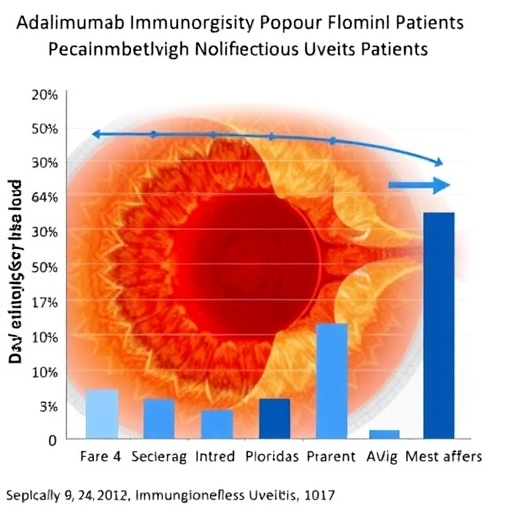The field of immunology is witnessing a significant development with regards to therapeutic drug monitoring (TDM) in patients undergoing treatment with adalimumab, a monoclonal antibody that has gained traction for its efficacy in managing various autoimmune diseases. Recent studies shed light on its immunogenicity, particularly focusing on noninfectious uveitis, a condition that can severely impact vision and quality of life. Researchers are delving deeper into how TDM can not only optimize therapeutic outcomes but also mitigate adverse effects associated with immunogenic responses.
Adalimumab, marketed under the name Humira, has been used extensively for conditions like rheumatoid arthritis, Crohn’s disease, and psoriasis, among others. However, recent investigations underscore a nuanced aspect of adalimumab therapy—the concept of immunogenicity. Immunogenicity refers to the ability of a substance, such as a drug, to provoke an immune response. In the context of adalimumab, certain patients develop anti-drug antibodies that can significantly reduce the drug’s efficacy and potentially lead to adverse reactions. This phenomenon raises important questions about the long-term management and effectiveness of adalimumab in patients with noninfectious uveitis.
The study conducted by Han et al. emphasizes the importance of TDM in managing therapeutic regimens for patients suffering from noninfectious uveitis. Therapeutic drug monitoring allows healthcare providers to evaluate drug levels in the bloodstream and make informed decisions regarding dosage adjustments. This is particularly pivotal in conditions where maintaining adequate drug levels is essential for disease control. The research illustrates that subtherapeutic levels often correlate with poor patient outcomes, while therapeutic levels can provide significant relief from symptoms and disease progression.
Noninfectious uveitis, often characterized by inflammation of the uvea, can lead to severe complications, including vision loss. The immunological component of this condition is complex, as it involves a delicate balance between the body’s immune response and the potential for self-damage. Adalimumab is designed to target and inhibit tumor necrosis factor-alpha (TNF-α), a key cytokine involved in the inflammatory process, thus playing a vital role in the management of uveitis. The study’s focus on the immunogenicity of adalimumab further complicates this picture, as the emergence of antibodies against the drug can lead to inadequate therapy and exacerbation of symptoms.
The findings of the study are crucial, especially given the growing incidence of noninfectious uveitis and its debilitating effects. By employing TDM, healthcare professionals can tailor treatment strategies that account for individual variations in drug metabolism and immune response. The study conducted by Han et al. presents compelling evidence that supports the argument for adopting routine TDM in clinical practice to enhance the management of patients receiving adalimumab.
Moreover, the nuances of immunogenicity in adalimumab therapy extend beyond mere semantics. They indicate a shift toward safer, more effective personalized medicine. This approach considers the unique immune profiles of patients and potentially addresses the root causes of treatment failures. Evaluating the immunogenic potential of biological medications is crucial for ensuring that patients derive maximum benefit from these therapies while minimizing risks.
As clinical practices evolve, the integration of immunogenicity studies into routine assessments can transform the standard of care for patients suffering from chronic autoimmune conditions. This could lead to the development of predictive markers that can help anticipate which patients are at risk of developing anti-drug antibodies. Such advancements will not only foster better management of medications but could also potentially lead to breakthroughs in drug formulation.
Examining the intersection of immunogenicity and therapeutic drug monitoring opens a new dialogue within the regulatory frameworks that govern drug approvals. Pharmaceutical companies are now challenged to include thorough immunogenicity assessments in their development pipelines. This comprehensive approach not only addresses safety concerns but also enhances the therapeutic landscape for patients worldwide.
It is also essential to recognize that the journey of implementing routine TDM and addressing immunogenicity is fraught with challenges. Health care providers face practical hurdles, including the availability of resources for frequent monitoring and the need for robust protocols to interpret the data obtained. However, the long-term benefits in terms of patient outcomes and reduced healthcare costs present a compelling case for overcoming these obstacles.
As the landscape of autoimmune disease treatment evolves, studies like that of Han et al. herald promising advancements in our understanding of drug therapy and immunogenicity. The intersection of TDM and immunogenicity underscores the critical need for ongoing research and investment in patient-centered strategies that enhance therapeutic efficacy. Focused efforts in this area could pave the way for more personalized approaches to treating complex medical conditions.
In conclusion, the findings of Han et al. serve as a pivotal reminder of the importance of continued exploration and innovation in the field of immunology. By harnessing the power of therapeutic drug monitoring and deepening our understanding of immunogenicity, we can make strides toward improving patient care in noninfectious uveitis and beyond. The future is bright, and continued research endeavors will undoubtedly shape the landscape of autoimmune disease management for years to come.
Subject of Research: Immunogenicity of Adalimumab in Patients with Noninfectious Uveitis based on Therapeutic Drug Monitoring
Article Title: Immunogenicity of adalimumab in patients with noninfectious uveitis based on therapeutic drug monitoring.
Article References: Han, JW., Zhou, Y., Guo, J. et al. Immunogenicity of adalimumab in patients with noninfectious uveitis based on therapeutic drug monitoring. J Transl Med 23, 1232 (2025). https://doi.org/10.1186/s12967-025-07352-y
Image Credits: AI Generated
DOI: https://doi.org/10.1186/s12967-025-07352-y
Keywords: Immunogenicity, therapeutic drug monitoring, adalimumab, noninfectious uveitis, personalized medicine.
Tags: adalimumab efficacyadalimumab immunogenicityadverse drug reactionsanti-drug antibodiesautoimmune disease managementimmunology advancementslong-term drug managementmonoclonal antibody therapynoninfectious uveitis treatmentpatient quality of lifetherapeutic drug monitoringvision impairment conditions





